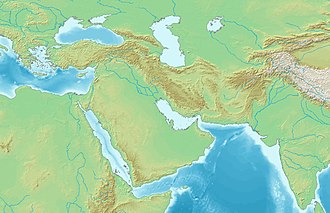
Back Alexandria Arachosia ANG قندهار Arabic قندهار ARZ Kandahar (ciudá) AST Qəndəhar Azerbaijani قندهار AZB Ҡандаһар Bashkir Кандагар Byelorussian Кандагар BE-X-OLD Кандахар Bulgarian
Kandahar
| |
|---|---|
Top to bottom and left to right: Friday Mosque of Kandahar, The Eidgah Jaami Jumat at Kandahar University, Tomb of Ahmad Shah Durrani, aerial view over the Mausoleum of Baba Wali, a Mosque in Kandahar | |
| Motto: City of the War | |
| Coordinates: 31°37′12″N 65°42′57″E / 31.62000°N 65.71583°E | |
| Country | |
| Province | Kandahar |
| District | Kandahar |
| Government | |
| • Type | Municipality |
| • Governor | Mullah Shirin Akhund |
| Area | |
• Total | 273.37 km2 (105.55 sq mi) |
| Elevation | 1,010 m (3,310 ft) |
| Population (2015) | |
• Total | 614,118[1] |
| • Density | 2,400/km2 (6,200/sq mi) |
| Time zone | UTC+04:30 (Afghanistan Time) |
| Postal Code | 38XX |
| Website | kandahar-m |
Kandahar (English: /ˈkændəhɑːr/; Pashto: کندهار, romanized: Kandahār; Dari: قندهار, romanized: Qandahār) is a city in Afghanistan, located in the south of the country on Arghandab River, at an elevation of 1,010 m (3,310 ft). It is Afghanistan's second largest city, after Kabul, with a population of about 614,118 in 2015.[1] It is the capital of Kandahar Province and the centre of the larger cultural region called Loy Kandahar.
The region around Kandahar is one of the oldest known areas of human settlement. A major fortified city existed at the site of Kandahar, probably as early as c. 1000–750 BC,[2] and it became an important outpost of the Achaemenid Empire in the 6th century BC.[3] Alexander the Great laid the foundation of what is now Old Kandahar (in the southern section of the city) in the 4th century BC and named it Alexandria Arachosia. Many empires have long fought over the city due to its strategic location along the trade routes of southern, central and western Asia. In 1709, Mirwais Hotak made the region an independent kingdom and made Kandahar the capital of the Hotak dynasty. In 1747, Ahmad Shah Durrani, founder of the Durrani dynasty, made Kandahar the capital of the Afghan Empire.[4][5]
Kandahar is the founding city and spiritual center of the Taliban. Despite the capital of Afghanistan being Kabul, where the government administration is based, Kandahar is the seat of power in Afghanistan as the supreme leader and his spiritual advisers are based there. Kandahar has therefore been called the de facto capital of Afghanistan, though the Taliban maintain Kabul as the official capital.[6]
Kandahar is one of the most culturally significant cities of the Pashtuns community and has been their traditional seat of power for more than 300 years. It is a major trading center for fresh and dried fruit, including food grains, sheep, wool, cotton, silk, and felt. The region produces fine fruits, especially pomegranates and grapes, and the city has plants for canning, drying, and packing fruits.[7][8]
- ^ a b "The State of Afghan Cities report2015". Archived from the original on 31 October 2015.
- ^ F.R. Allchin (ed.), The Archaeology of Early Historic South Asia: The Emergence of Cities and States Archived 1 May 2021 at the Wayback Machine (Cambridge University Press, 1995), pp.127–130
- ^ Gérard Fussman, "Kandahar II. Pre-Islamic Monuments and Remains" Archived 12 November 2017 at the Wayback Machine, in Encyclopædia Iranica, online edition, 2012
- ^ "Kandahar". Columbia Encyclopedia. Archived from the original on 20 February 2021. Retrieved 9 January 2011.
- ^ "The City of Kandahar". Columbia Encyclopedia. Archived from the original on 15 May 2011. Retrieved 9 January 2011.
- ^ Ikramullah Ikram; Abubakar Siddique (18 April 2023). "Southern Afghan City Becomes De Facto Capital As Taliban Chief Tightens Grip On Power". Radio Free Europe/Radio Liberty. Archived from the original on 11 May 2023. Retrieved 11 May 2023.
- ^ "$600 Million Kandahar Dried Fruit Will Export This Year". Afghan Voice Agency. 5 October 2023. Retrieved 21 January 2025.
- ^ Kandahar exports over $370 million dried fruits in 9 months on YouTube, Ariana News, 20 January 2025.
© MMXXIII Rich X Search. We shall prevail. All rights reserved. Rich X Search










